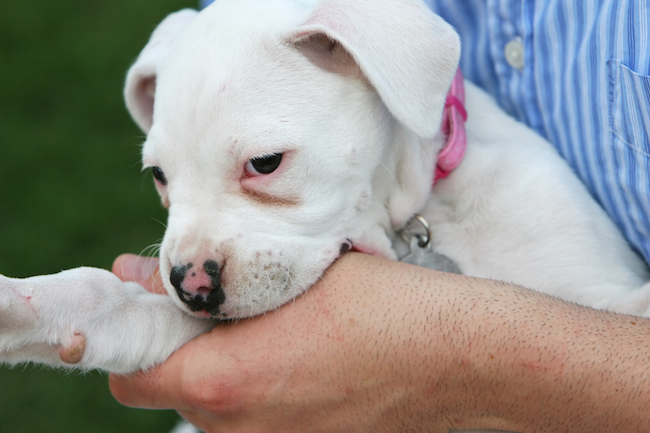Puppies like to chew. No matter what breed the dog is, young pups seem to gnaw and sink their teeth into anything they can find. When little dogs play with their owners, they often romp around and pounce on them, nipping and biting occasionally. But what begins as charming arm-chomps, or the harmless nibbling of fingers, can sometimes blur the lines of what is acceptable “petiquette” during playtime. If a dog is not discouraged from chewing on human hands, legs, and clothes when he is young, it will be more challenging to correct this in the future.
Tips on How to Stop Puppies from Biting
- Set the boundaries: First make it clear to all the humans involved (whether roommates or family members), that no hitting or slapping the dog should ever occur if he bites too hard. Agree that whenever biting does happen, that the action will be stopped and discouraged at once, without any harshness or violence.
- Discourage bad behavior: When your puppy bites, say “No.” Some pet owners will follow this by gently holding their mouths closed with their thumb and index finger to indicate what they mean. Every time the dog begins to nip, correct the behavior.
- Choose the right games: Tug of war is fun, but not always the best game to play with puppies who are still learning the ropes (pun intended!). Don’t wrestle your puppy down with your hand, or he may feel inclined to bite it. Instead offer him “yes” toys: chew toys that he CAN bite on, so that he with learn not to go for your sleeve or ankle.
- Try the “Off You Win” method: Help train your puppy to learn that he is rewarded whenever he takes his mouth off something. When he bites, pull him way, and hold a treat in your closed hand, letting him smell it. When he turns his nose away, wait for him to come back to your hand and say “Off” when you open your hand with the treat. Let him eat the treat out of your hand, and continue to practice this often, each time waiting varied intervals so your dog learns that the treat only comes with the word “off.” This way, when the puppy is biting, he will learn to obey quickly when commanded “off.” A trainer named Carolyn Clark called this the “Off You Win” game, and it works best with puppies who chomp, chew, or tug on their owners.
- Give a positive spin: Puppies need to learn how to be handled from an early age, so use their mouthing to your advantage! If they are starting to chew and bite, take this an opportunity to help them get used to mouth handling. Take control of the situation: pick up the dog and hold him while you move your fingers inside their mouths, rubbing their gums, tongue, etc. This will make your job (and the vet’s job) easier when it comes to your daily dental care routine.

